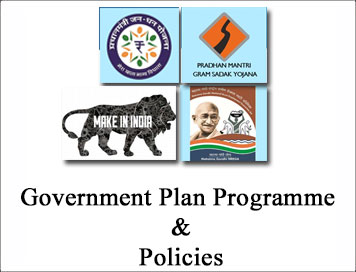NEW! The Gist (FREE) | E-BOOKS |
National Civil Aviation Policy: Government Plan Programme Policies for UPSC Exam

Government Plan Programme Policies for UPSC Exam
:: National Civil Aviation Policy (NCAP 2016 – Vision, Mission and Objectives) ::
Vision: To create an eco-system to make flying affordable for the masses and to enable 30 crore domestic ticketing by 2022 and 50 crore by 2027, and international ticketing to increase to 20 crore by 2027. Similarly, cargo volumes should increase to 10 million tonnes by 2027.
Mission: Provide safe, secure, affordable and sustainable air travel for passengers and air transportation of cargo with access to various parts of India and the world.
Objectives:
i) Establish an integrated eco-system which will lead to significant growth
of civil aviation sector, which in turn would promote tourism, increase
employment and lead to a balanced regional growth.
ii) Ensure safety, security and sustainability of aviation sector through the
use of technology and effective monitoring.
iii) Enhance regional connectivity through fiscal support and infrastructure
development.
iv) Enhance ease of doing business through deregulation, simplified procedures
and e-governance.
v) Promote the entire aviation sector chain in a harmonised manner covering
cargo, MRO, general aviation, aerospace manufacturing and skill development.
NCAP 2016 covers the following policy areas:
a) Regional connectivity
b) Safety
c) Air Transport Operations
d) Route Dispersal Guidelines
e) 5/20 Requirement for International Operations
f) Bilateral traffic rights
g) Code-share agreements
h) Fiscal Support
i) Airports developed by State Govt, Private sector or in PPP mode
j) Airports Authority of India
k) Air Navigation Services
l) Aviation security, Immigration and Customs
m) Helicopters
n) Charters
o) Maintenance, Repair and Overhaul
p) Ground handling
q) Air-cargo
r) Aeronautical ‘ Make in India’
The policy is very comprehensive, covering 22 areas of the Civil Aviation sector. Its salient features are as follows :
Regional Connectivity Scheme
- This scheme will come into effect in the second quarter of 2016-17
- Airfare of about Rs2500 per passenger for a one-hour flight This will be implemented by way of:
- Revival of airstrips/airports as No-Frills Airports at an indicative cost of Rs.50 crore to Rs100 crore
- Demand driven selection of Airports/airstrips for revival in consultation with State Govts and airlines
- ViabilityGapFunding(VGF)toairlineoperators
- RCS only in those states which reduce VAT on ATF to 1% or less, provide other support services and 20% of VGF.
- Concessions by Stakeholders
- There will be no airport charges
- Reduced Service tax on tickets (on 10% of the taxable value) for 1 year initially
- Reduced Excise duty at 2% on ATF picked at RCS airports
- State government will provide police and fire services free of cost. Power, water and other utilities at concessional rates
Policy also aims to create a Regional Connectivity fund for VGF through a small levy per departure on all domestic flights other than Cat II/ Cat IIA routes, RCS routes and small aircraft below 80 seats at a rate as decided bythe Ministry from time to time. VGF to be shared between MoCA and State Governments in the ratio of 80:20. For the North Eastern States, the ratio is 90:10.
National civil aviation policy also comes up with Route Dispersal Guidelines (RDG) for better mangement of route and traffic. Important route dispersal guidelines are given below:
- Category I to be rationalized based on a transparent criteria, i.e., flying distance of more than 700km, average seat factor of 70% and above and annual traffic of 5 lakh passengers
-
The percentage of Cat.I traffic to be deployed on Cat.II, and IIA will remain the same while for CATIII it will be 35%. Routes to Uttarakhand and Himachal Pradesh included in Category II
- Revised categorization to apply from winter schedule of 2017
- There view of routes will be done by MoCA once every 5 years
- Withdrawal or revision of domestic operations to and within North East Region etc, subject to full compliance of RDG, can be done under prior intimation to MoCA at least three months before withdrawal or revision of the service

